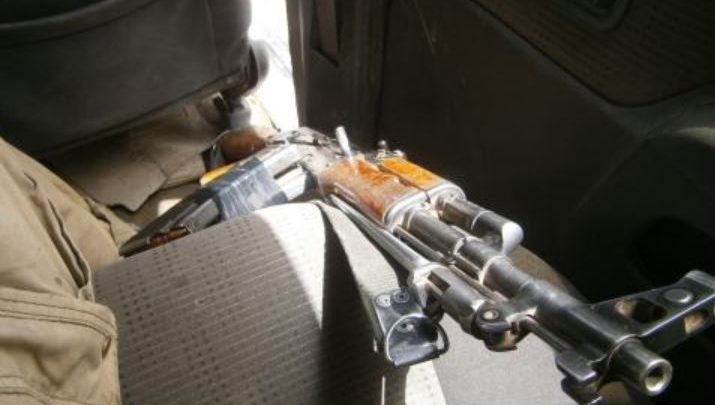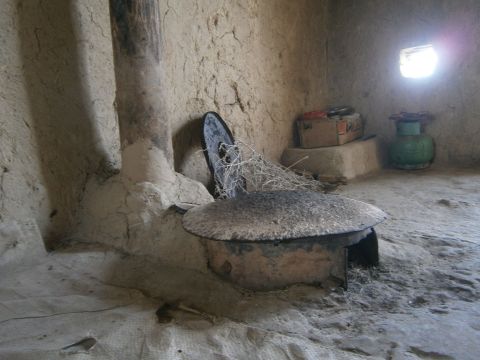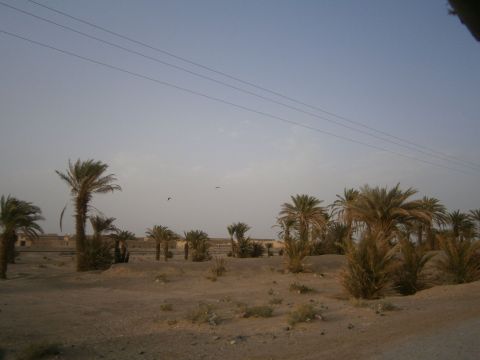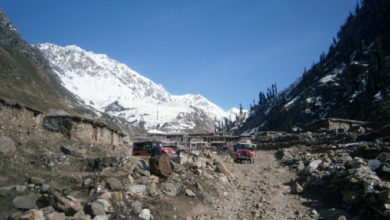Pakistan and traveling near the border to Afghanistan
A wild adventure

We started our journey hitchhiking from Bulgaria, through Turkey and Iran. We arrived close to the Iran-Pakistan border and are about to cross it.
On 16.04 around 8 o’clock our friends drive us down town and we catch a shared taxi with some other people. Prices are high, around 3$ per person, for only 60-70 km. On the road we see a group of around 40 Balochi people, lined-up under the sun. We think that they are waiting for a group of white jeeps that we passed by some time ago. They look really impressive with their “white pajamas” and Kalashnikov guns.
Typical dress in Pakistan – shalvar kameez
We pass the border easily. The people in Pakistan are quite different – they have long beards and wear typical Muslim caps and kurta-pajamas. After we enter we are taken to a small fort in the border town Taftan. Time here seems to flow so slowly like it has almost stopped. Nobody seems to care about anything. Now we start our real journey in Balochistan.
People bring on their Kalashnikov guns all the time
We travel with the jeeps of Levies – a special escort through the desert. When we reach a checkpoint we stop in order to change cars, but usually it takes time in order this to take place. Outside is really hot – almost 40 degrees Celsius (104 degrees Fahrenheit) and the silence is deafening. Every time we get in the next car we are accompanied by the driver and two armed policemen from the Levies. People from the escort are really nice and give us bread and water all the time.
Delicious Pakistan bread
All is calm and languid. The road is often covered with sand, we see dunes and sometimes pasturing camels. The scenery consists of yellow sand, black rocks, sometimes green bushes and the always present impressive mountains. The width of the desert is grand and invokes unexplainable feelings. It is 40 degrees Celsius (104 Fahrenheit) but it is better than 50 degrees (122 Fahrenheit) as they told us the temperatures are in July. In the people’s houses, made of sun-dried bricks, is cool and the water that people keep in their pitchers is even cold.
Around us feeble goats eat plastics and rocks and from time to time we see single ginger-colored, one-hunch camels pasturing near the road. I can’t imagine what it will be like to enter deep in the desert. In my opinion you will bite the dust regardless of the water you bring on. I don’t know where the bandits hide in these areas or how they survive here.
At every checkpoint we stop and write our personal data in some notebooks which slows us down considerably because the check points are now at every 20-30 km. The jeeps of the escort change every 80 or so km and this slows us down additionally. Almost all the buildings we pass by are made of clay and sun-dried bricks and most of them are forts or military structures. The first 300 km after the border there are not much villages and everything is sand and rocks. Around 7 o’clock in the evening we reach Dalbandin – the small town where we stop for a rest.
Desert near the road
The moment we arrive the fun begins. They drive us to a hotel where we are supposed to pay 10$ per night. This is high price for Pakistan so we say we will pitch our tent in the yard or we will sleep near the police station – as we often did in Iran. The policemen say that it is impossible because I am a woman. After some arguing the manager lowers the price to 5$ and we finally agree to take the hotel room. The armed escort Levies leaves and two local policemen stay with us to guard us.
The local policemen
They follow us closely everywhere we go in the hotel and at the end they sit in our room and start chatting with us. At this moment a guy shows up and says the room costs 600 not 500 rupees and in addition after 5 min. the policemen said that we have to pay for their dinner – 500 rupees (5$). This drives us nuts and we tell them that we will go outside and pitch our tent and that we don’t need their rooms or whatsoever.
In the end we are tired of everything, since we hadn’t eaten almost anything for 2 days because of the constant hurry and we decide we will sleep in the room. And then there is another problem – we don’t have Pakistan rupees and the dollars we have are in 100$ bills.
Street in Quetta
The situation outside is wild – all the people look to us like Taliban (though we think that is how the Balochi people normally look like) – with long beards, turbans and shawls all over their faces. It turns out we can’t exchange money outside and the oily owner of the hotel offers us really low rates and says this is the normal rate for this region. We have no option and we give him our money losing at least 10$ from the “deal”.
My mood is really bad now and we just want to go to bed. After we pay everyone is happy except us and the policemen keep hanging in our room and keep talking in their broken English. One of them is 27 years old and has 5 children, the other one has 9. Finally they leave, we take a shower and crash in our beds without even having a dinner.
Traveling with the Levies
17.04
In the morning the Levies are here, waiting for us to get up so we pack quickly and leave without having breakfast. At noon we stop at a small house and eat chapattis (flat bread) and we dip them in one big bowl full of lentils – it is really delicious and everyone takes really good care of us.
The house
One of the guards show us some papers. It results the papers are his “license to kill” – special document that says (in English) he can shoot at people with his Kalashnikov gun without orders in case of emergency. He explains to us that this is because their bases and the Iranian buses full of pilgrims are under constant threat.
The gun with the “license to kill”
The road we are on from Taftan (the border between Pakistan and Iran) to Quetta (the capital of Balochistan) passes by close to the border with Afghanistan. Some of our guards claim that the threat comes from Afghanistan Taliban, other say that the road is totally safe for tourists and one of them tells us the Balochi people are the real terrorists – to summarize: the situation is obviously unclear here.
In my opinion the guards take very good care of us and their comrades – they do their job very well. The escort is free from Taftan to Quetta (600 km.) and you don’t need to pay for the ride, the food or the water they give you all the time. In the notebooks at the checkpoints we see that westerners pass by every two or three days and the attacks aimed at tourists are just a few for the last 10 years. But the assaults on churches, Shiite mosques and government buildings are quite a lot. So the risk is small enough for travelers.
View from the jeep
We see more and more grazing camels near the road and we enter the sand desert. We notice some big lakes at the horizon but it turns out they are just mirages. Some parts of the road are very good while others are with huge holes and the jeep drives through the desert because it jolts less that way.
Camel
Our nightmare starts in the early afternoon. The escorts change more and more often and the villages along the road become less. The jeeps are changed with pick-ups that are older and slower and we have to ride outside in the carriage. The guards drive like crazy and the wind is hitting us hard on the faces. Good for us that some of the pick-ups are covered with cloth and we are hidden from the fury of the sun’s blaze. Sand is all over us despite we are fully wrapped up with shawls.
Rocky desert
I feel the sand in my mouth constantly and I start shaking from exhaustion. The last 20 km are terrible as we change the cars 5 times. At last we reach the outskirts of Quetta – but the madness is not over yet. There is one part of the road just before entering the city that we have to pass on motorbikes.
Mr. Shushtari (my husband) and I get on a motorcycle with the rucksacks on our backs and two other motorbikes come with us to guard us. The guards driving in front of us hold their Kalashnikov guns ready and look around themselves like crazy, on the motorbike behind are the other three guards dressed with bulletproof vests. I think now everybody in town knows we are coming. The guards drive recklessly through the chaos of tuk-tuks (something like motorbike with a rooftop), pedestrians and trucks.
We catch a glimpse of Afghanistan women dressed in burkas with nets covering their eyes. When we get off the motorbike my legs are shaking. I beg the guards to take a rickshaw for the next leg of the journey and like this we get to the hotel. They don’t want to let us pitch our tent in the yard so we start negotiating with another oily and mercantile owner.
Quetta
There are just two hotels that accept foreigners and their prices are high. We manage to negotiate a price of 13$ for the room. We can’t wait to catch the train, get out of Balochistan and start doing things our way. Our hotel looks like military fort and has special admission rules which basically say that you can’t leave it – especially now when it is already dark outside.
Now the situation in the city is even more tight compared to 2013-2014 when tourists could take a bus from Taftan (the border) to Quetta. Now you are obliged to travel with escort and when you are in the city you have to stay at the hotel. Most people come here by car or motorbike and rarely people tra el without their own vehicles.
PCT – Pakistan City Transport
Summary Balochistan-Pakistan: This is one of the most amazing places we have ever been. It is another world and the risk was worth it (though the risk to be killed by some reckless driver on the highway is quite much bigger in my humble opinion). This is the most staggering journey we have ever done and one of the most impressive and differing worlds we have ever seen. The desert, the hundreds kilometers of wilderness, the cities, the people… it is unimaginable. I highly recommend this trip for those who can endure.
More adventures and articles at MagicKervan.com
In the evening we eat well and before we went to bed we saw a Swedish guy who told us that a few days ago government troops killed some big fish Taliban leader and 50-60 of his supporters.
18.04
In the morning we get up ready for today’s “battle”. The first thing we do is escape from the hotel secretly and go to the train station to see when the train to Multan leaves since we can’t think of other means of transport here.
The last train for the day leaves in half an hour and we run back to the hotel to take our backpacks and passports. The owner of the hotel refuses to give us back the passports until the policemen arrive and we start arguing hotly. We suspect that his idea is to make us stay more days at the hotel. He says that we need a special permit (N.O.C.) to leave Balochistan and it will be ready on Monday – in three days. We wait for the policemen to come and miss the last train.
We decide to go out and have a breakfast and despite the orders of the owner of the hotel not to do it, we leave in an offhand manner. Outside is the real deal. Imagine Pakistan like Muslim India – so you guess right that the chaos on the streets is omnipresent. We find a really nice and small restaurant further down the street and sit to eat. We haven’t managed to finish our food and here come the policemen. They are care free as usual and wait for us to finish eating. When we go back to the hotel the owner starts to rattle that we don’t have the permit (N.O.C.) to leave Balochistan and we have to stay in the hotel.
Street in Quetta
I started to yell at him that we have a flight from Islamabad on Monday (this is a strategic lie) and we can’t stay two more nights. In addition we know that one needs this permit for the road coming from Taftan, not for the safe areas after Quetta. Finally the policemen take us with them at the police station and we are happy to be here because it is nicer and we have company. The policemen treat us to tea and are really friendly. They even put the TV on but it is broken so we watch the moving black and white dots on the screen.
We had to wait for six hours just to find out that we can’t leave without this special permit (N.O.C). We try to persuade them that we take fully the responsibility but the policemen don’t agree so we decide to wait here. We became friends with the policemen and at least we can talk to them and watch the street from something that resembles balcony. Everyone is really nice and keeps repeating that we are their guests and they just want to keep us safe from the Taliban and the Balochi. We think they just want to double check on themselves because outside is not dangerous at all.
Most of the people at the police station are Pashtu because some time ago this city belonged to Afghanistan. Some of the policemen are Balochi and no one is Urdu. On the streets one can see what the Muslim world looked like many years ago.
Transport
The dusty, cranky streets are full of carriages pulled by donkeys, old Pakistani men with long white beards, thousands of craftsman shops and everyone is dressed with the typical shalvar kameez – white, blue or cream-colored. 97 % of the people are men. If you can see a woman she is usually dressed with colorful indian clothes and is covered (including usually their face) with long cloths. Afghanistan women wear blue burkas.
Our policemen friends tell us that people here usually have around 5 to 10 children and that they personally know a guy who has 23. One boy told me that his grandfather had built enormous house but his children had many children and now 85 people in total live there.
In the evening we pitch our tent and organize our camp in one of the offices.
Palm trees





















